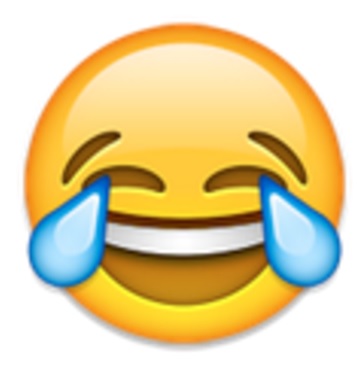Emoji Word of the Year Earns a Thumbs Down

Image courtesy of emojipedia.org
This year the Oxford English Dictionary released the “tears of joy” emoji as the 2015 Word of the Year.
January 4, 2016
With the close of the year 2015, Oxford Dictionary released its annual Word of the Year…but wait, it’s not even a word?
Oxford Dictionary recently named the “tears of joy” emoji the 2015 Word of the Year, as SwiftKey, a mobile technology business, found it to be the most used emoji this year, making up 17 percent of all emojis used by U.S. smartphone users in 2015.
Making the “tears of joy” emoji Word of the Year may be seen as somewhat of an iconic choice, as it represents the prevalence of symbols in modern communication and texting. However, an emoji is not a word, and it can’t be found in a dictionary. If it can’t be found in a dictionary, it shouldn’t be able to qualify as “Word of the Year.”
Arguably, this emoji isn’t much better than last year’s word “vape,” or 2013’s word “selfie.”
In general, these words can be seen as negative representations of our generation. Selfie? Vape? Really? Is our generation so egocentric and obsessed with electronic smoking devices that these words should characterize our entire existence for the past few years?
And now the emoji. Has human interaction regressed back to symbols, to the point where even typing “LOL” is too much work?
Not to mention, these words only really represent the younger generation. What about everyone else?
People still use full words (not just slang, emojis and acronyms) to communicate. We are also concerned with bigger and broader issues than what can be represented by an emoji. Perhaps “they,” a word that made it to the Word of the Year shortlist, should have won. “They” is used to refer to a singular person of unspecified sex, which is significant in symbolizing the strides of progress that transgender people, namely Caitlyn Jenner, have made in 2015.
Or perhaps, “refugee,” another word that made the shortlist but didn’t win. “Refugee” is defined as a person who has been forced to leave their country to escape war, persecution, or natural disaster. This year saw the crisis of displaced peoples rise significantly.
According to Oxford Dictionary, Oxford’s language monitoring corpus has shown the word “refugee” increasing by 110 percent.
Oxford Dictionary is a dictionary, and the dictionary definition (from Oxford Dictionary itself) of “dictionary” is “A book or electronic resource that lists the words of a language (typically in alphabetical order).”
An emoji doesn’t fit either criteria–it’s not a word, and where would it even fall in an alphabetized dictionary? What would its definition even be?
Call me traditional, but I hope that next year’s Word of the Year will actually be a word.

